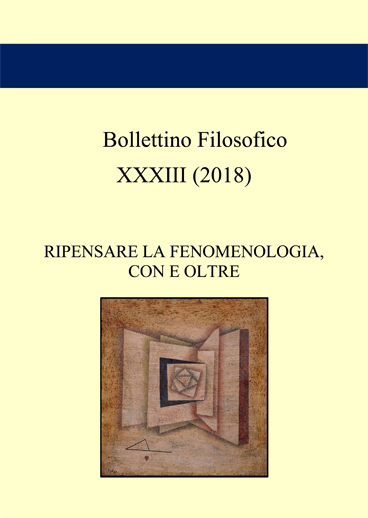Per una nuova fenomenologia della natura. La filosofia delle atmosfere di Gernot Böhme
Abstract
The paper aims to interpret the proposal of the German philosopher Gernot Böhme of a new phenomenology of nature in the sense of an integration of the classical Husserlian phenomenology which, according to Böhme, had neglected the phenomenon of nature thus becoming a pure analysis of consciousness with a strong transcendental character. The starting point is the New Phenomenology of Hermann Schmitz, who affirms that phenomenon is a “giveness in bodily tracks”. Böhme emphasizes the concrete human bodily experience in the natural environment with the practical (ethical and ecological) purpose to show that humans are a part of nature. To this purpose, he goes back to the Aristotelian conception of nature and to Goethe's theory of colours. The way in which Nature influences our own feeling of being-there (Befindlichkeit) is named by Böhme atmosphere. In its peculiar ontological quality (the atmospheres are “quasi-things” and place themselves in an intermediate sphere between subject and object), the atmosphere is the new phenomenological core of the conceiving of nature. Böhme interprets the atmospheres as irradiation and evocation of spaces, things and human beings, bodily resonances of living physical, architectonical and natural environments that we can perceive through particular aesthesiological experiences. The physiognomic and expressive power of natural atmospheres, that Böhme finds especially in landscapes, represents the most peculiar character of his phenomenology of atmosphere.
Downloads
Bollettino Filosofico pubblica in internet, ad accesso aperto, con licenza:
|
|
CCPL Creative Commons Attribution |
L'autore conserva il copyright sul suo contributo, consentendo tuttavia a chiunque "di riprodurre, distribuire, comunicare al pubblico, esporre in pubblico, rappresentare, eseguire e recitare l'opera", purché siano correttamente citati l'autore e il titolo della rivista. L’autore, al momento della proposta di pubblicazione, è inoltre tenuto a dichiarare che il contenuto e l’organizzazione dell’opera è originale e non compromette in alcun modo i diritti di terzi, né gli obblighi connessi alla salvaguardia di diritti morali ed economici di altri autori o di altri aventi diritto, sia per testi, immagini, foto, tabelle, sia per altre parti di cui il contributo può essere composto. L’autore dichiara altresì di essere a conoscenza delle sanzioni previste dal codice penale e dalle leggi speciali per l’ipotesi di falsità in atti ed uso di atti falsi, e che pertanto Bollettino Filosofico è esente da qualsiasi responsabilità di qualsivoglia natura, civile, amministrativa o penale, e sarà dall'autore tenuta indenne da qualsiasi richiesta o rivendicazione da parte di terzi.
